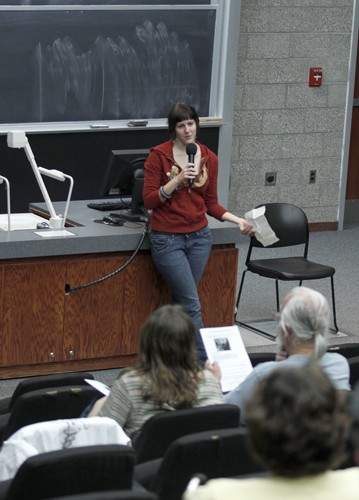Monday night filmmaker Moriah Mason participated in a special UA showing of her film, The Groundwater Up Project as part of the film’s international premiere hosted by Voices of Opposition Monday Night Film & Lecture Series. The film, which documents aspects of the current water crisis in Delhi, India, was screened at the Aerospace and Mechanical Engineering building auditorium and coordinated with showings in Delhi, India and Vancouver, Canada. The 23-year-old filmmaker is a 2009 graduate of Sarah Lawrence College, and graduate of the International Honors Program “”Rethinking Globalization”” Study Abroad Year. On Tuesday afternoon, she sat down for an interview with the Arizona Daily Wildcat.
What is the central message you and your fellow filmmakers try to convey in “”The Groundwater Up Project?””
Our central message is that you don’t need to be an expert to understand where your water is coming from or to take part in, and take control of, how to use it. Everyone should be part of taking care of their water.
How did you come to make films? Did you study filmmaking in school?
No, I didn’t. I studied dance and international development at my school. I learned how to operate a camera and how to edit, on the job (while making this film).
Did you find that process useful — the learning process of just kind of being thrown into making a film?
Yeah, I really enjoyed learning the skills of filmmaking. It was exciting to have new tools with which to communicate the things we were learning via film. It was different than the things I learned in writing essays in school or choreographing dances. Film is especially exciting because of the number of people it has the potential to reach.
In a December 2008 interview in The Progressive magazine, prominent water justice advocate, Maude Barlow, calls the global water crisis “”the most important human rights and ecological crisis of our time.”” Do you think that’s accurate?
I definitely agree with that statement. The water crisis is something that is becoming more and more evident in just about every community on the planet. It is going to be exacerbated by global warming. But I think there is great potential and hope in the organizing that is happening around water. Because everybody needs water. And it cuts across social constructions that separate us. It creates the possibility for a great deal of solidarity across a great number of boundaries.
Does the water crisis in Delhi have anything to do with other water crises in other places throughout the world?
The water crisis in Delhi is created by over-consumption, unequal distribution, excessive pollution and also cementation from increasing urban development. These are issues in most communities, including Tucson.
What does all this have to do with privatization of water?
As water becomes a more scarce resource, on the one hand, corporations are finding opportunities to profit from the scarcity of water, either by bottling water and selling it as a couture or luxury product, or by taking over water systems previously operated by cash-strapped local governments.
When corporations take over the operation of water systems they tend to raise prices and not maintain the local infrastructure. There’s no incentive (for corporations) to provide water to those who can’t pay for it. So the basic premise of water as a right is in opposition to the corporate need for profit.
This is your first time in Tucson, right?
Yeah.
I suppose you’ve noticed the green plots and manufactured grasslands in the city, especially on our campus. What do you think about these sorts of displays in places like the Sonoran Desert where grass would never grow naturally and thus needs to be constantly pampered with water to keep it green?
I think it’s unfortunate that the aesthetic of a green lawn is given so much primacy when there’s so much beauty in the local environment that could be enjoyed. The desert is breathtaking, so why would you try to mimic an East Coast lawn, or West Coast lawn, for matter?
Barlow takes note of a water justice movement full of what she identifies — herself included — as “”Water Warriors.”” Do you consider yourself a “”Water Warrior?””
(Laughs.) I don’t know how to respond to that. I think it’s a funny concept. I don’t really like using militaristic language in a movement that is based upon solidarity and taking care of the environment and each other, rather than exploiting the environment and people. So, maybe I’m a “”Water Carer”” or a “”Water Wuss”” or whatever you want to call it. I don’t think we need to call ourselves “”Water Warriors”” to be badass.









